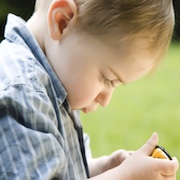 Kristina Afanasyeva/PhotoSpin
Kristina Afanasyeva/PhotoSpin
Mothers are more important to their children than the fathers through nurture, not just nature, according to The American Journal of Psychiatry. For infants and toddlers, the impact of a mother’s depression can be significant.
During the first year of a baby’s life, an attachment, or an emotional bond, develops between the mother and child. Their attachment is the emotional bond that develops between the mother and baby during the first year of life. The mother helps her child to regulate his or her physical and emotional state, anticipates her child’s needs and responds to her baby’s signals, according to the Child Study Center at Aboutourkids.org.
This attachment relationship is key to the development of the child. It serves as a model for interpersonal relationships and a predictor of a child’s adjustment in the future.
The behaviors of depressed mothers, such as being withdrawn or inconsistent with nurturing, influence the development of their children.
A mother’s nurturing abilities are affected by postpartum depression, which directly affects the child. The child may become depressed as well. Depressed mothers not only affect a child’s behavioral development, but their physical development as well. According to research it may even be possible for the child’s height to be affected.
NBC news reported recently that, nine months after giving birth, mothers who have postpartum depression could have kids that are shorter than others as kindergarteners.
The report, published in the journal Pediatrics, indicated that 5-year-olds with depressed mothers were almost 50 percent more likely to be the shortest 10 percent of kids of that age group.
Mothers that were moderately or severely depressed increased the chance of their kids being short from 40 percent at age 4 to almost 50 percent at age 5, according to the research.
NBC news interviewed Dr. Andrew Leuchter, a professor of psychiatry at the University of California, Los Angeles, who said that the study’s findings may give doctors a new tool and may use a child being short for their age as a warning sign of depressed mothers.
The researchers plan to investigate how depressed mothers have children that are shorter, but doctors have some ideas as to why, NBC news reported.
Maternal depression is known to be bad for kids as the mothers may neglect basic needs of their children by not interacting with them, Leuchter told NBC news.
Postpartum depression is treatable, but it affects about 13 percent of women after giving birth, according to WebMD.com.
Postpartum depression symptoms include: depressed mood, trouble sleeping, changes in appetite, anxiety and frequent changes of emotions. Mothers with postpartum depression may neglect the basic needs of their children.
Its symptoms make it hard to detect because they are similar to what is known as the "baby blues,” which affects more new mothers, but is short term.
The longevity of postpartum depression and the severe symptoms separates postpartum depression from “baby blues” as well as its impact on children well after birth.
Young children of depressed mothers seem more drowsy, passive, temperamental, afraid or anxious, than children of non-depressed mothers, according to Aboutourkids.org.
When Scientific American reported on depressive mothers in May 2010, Carol Weitzman, an associate professor of pediatrics at Yale University School of Medicine, said, “We can’t look at children’s health and function without looking at parents’ functioning.”
Sources:
Depressed moms, might have shorter kids, new study suggests. MSNBC. Retrieved September 12, 2012. http://www.msnbc.msn.com/id/48969446/ns/health-womens_health/t/depressed...
Depressed Mothers, Depressed Children. Retrieved September 12, 2012.
http://ajp.psychiatryonline.org/article.aspx?articleid=100103
Mothers' Depression Can Go Well Beyond Children's Infancy. Scientific American. Retrieved September 12, 2012.
http://www.scientificamerican.com/article.cfm?id=maternal-depression
A Visual Guide To Postpartum Depression. WebMD. Retrieved September 17, 2012.
http://www.webmd.com/depression/postpartum-depression/ss/slideshow-postp...
MOTHER BLUES – CHILD BLUES. How maternal depression affects children. Retrieved September 18, 2012.http://www.aboutourkids.org/files/articles/jan_feb_1.pdf
Reviewed September 18, 2012
by Michele Blacksberg RN






Add a Comment1 Comments
Please share the full source that states mothers are more important than fathers in the first year. I am interested to see the full study and how the researchers were able to determine this conclusion.
December 14, 2012 - 8:03pmThis Comment